Filter by
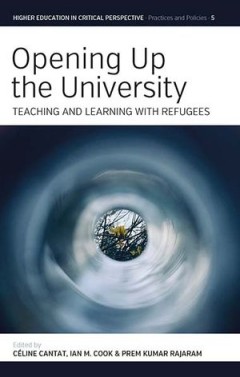
Opening Up the University : Teaching and Learning with Refugees
Through a series of empirically and theoretically informed reflections, Opening Up the University offers insights into the process of setting up and running programs that cater to displaced students. Including contributions from educators, administrators, practitioners, and students, this expansive collected volume aims to inspire and question those who are considering creating their own interv…
- Edition
- -
- ISBN/ISSN
- 9781800733138
- Collation
- -
- Series Title
- -
- Call Number
- -
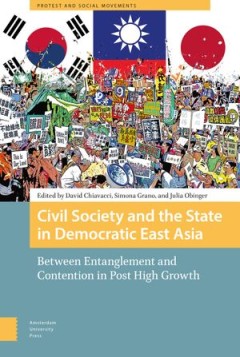
Civil Society and the State in Democratic East Asia Between Entanglement and…
This volume focuses on the new and diversifying interactions between civil society and the state in contemporary East Asia by including cases of entanglement and contention in the three fully consolidated democracies in the area: Japan, South Korea and Taiwan. The book argues that all three countries have reached a new era of post high-growth and mature democracy, leading to new social anxietie…
- Edition
- -
- ISBN/ISSN
- 9789048551613
- Collation
- -
- Series Title
- -
- Call Number
- -
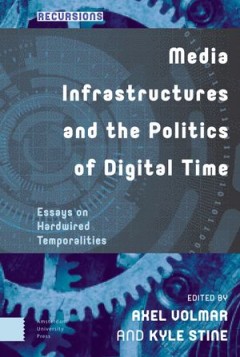
Media Infrastructures and the Politics of Digital Time Essays on Hardwired T…
Digital media everyday inscribe new patterns of time, promising instant communication, synchronous collaboration, intricate time management, and profound new advantages in speed. The essays in this volume reconsider these outward interfaces of convenience by calling attention to their supporting infrastructures, the networks of digital time that exert pressures of conformity and standardization…
- Edition
- -
- ISBN/ISSN
- 9789048550753
- Collation
- -
- Series Title
- -
- Call Number
- -
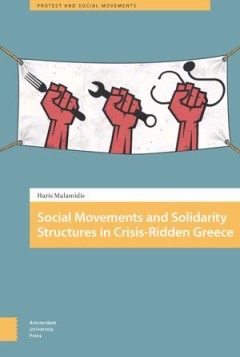
Social Movements and Solidarity Structures in Crisis-Ridden Greece
Social Movements and Solidarity Structures in Crisis-Ridden Greece explores the rich grassroots experience of social movements in Greece between 2008 and 2016. The harsh conditions of austerity triggered the rise of vibrant mobilizations that went hand-in-hand with the emergence of numerous solidarity structures, providing unofficial welfare services to the suffering population. Based on qualit…
- Edition
- -
- ISBN/ISSN
- 9789048551460
- Collation
- -
- Series Title
- -
- Call Number
- 302 MAL s
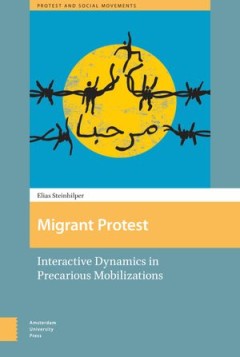
Migrant Protest: Interactive Dynamics in Precarious Mobilizations
Migrant protest has proliferated worldwide in the last two decades, explicitly posing questions of identity, rights, and equality in a globalized world. Nonetheless, such mobilizations are considered anomalies in social movement studies, and political sociology more broadly, due to 'weak interests' and a particularly disadvantageous position of 'outsiders' to claim rights connected to citizensh…
- Edition
- -
- ISBN/ISSN
- 9789048550197
- Collation
- -
- Series Title
- -
- Call Number
- 351.81 STE m
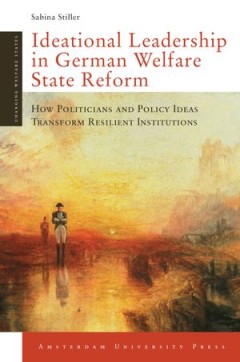
Ideational Leadership in German Welfare State Reform
The author of this innovative study argues that key politicians and their policy ideas, through "ideational leadership", have played an important role in the passing of structural reforms in the change-resistant German welfare state. This argument is based on in-depth case studies of individual reforms in health care, pensions and unemployment insurance since the early 1990s as well as a concis…
- Edition
- -
- ISBN/ISSN
- 9789089641861
- Collation
- -
- Series Title
- -
- Call Number
- 320 STI i

Media Infrastructures and the Politics of Digital Time Essays on Hardwired T…
Digital media everyday inscribe new patterns of time, promising instant communication, synchronous collaboration, intricate time management, and profound new advantages in speed. The essays in this volume reconsider these outward interfaces of convenience by calling attention to their supporting infrastructures, the networks of digital time that exert pressures of conformity and standardization…
- Edition
- -
- ISBN/ISSN
- 9789048550753
- Collation
- -
- Series Title
- -
- Call Number
- -
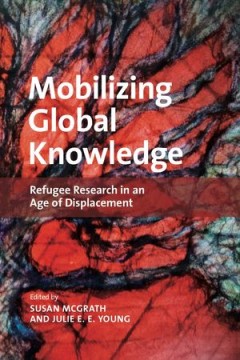
Mobilizing Global Knowledge Refugee Research in an Age of Displacement
In 2018, the United Nations High Commission for Refugees documented a record high 71.4 million displaced people around the world. As states struggle with the costs of providing protection to so many people and popular conceptions of refugees have become increasingly politicized and sensationalized, researchers have come together to form regional and global networks dedicated to working with dis…
- Edition
- -
- ISBN/ISSN
- 9781773850863
- Collation
- -
- Series Title
- -
- Call Number
- -
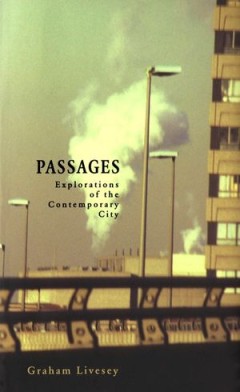
Passages Explorations of the Contemporary City
Informed by the work of writers such as Henri Lefebvre, Paul Ricoeur and Michel de Certeau, this collection of essays examines through multiple lenses eight topics related to the contemporary urban domain. The author employs powerful geographic and literary concepts such as space, narrative, and metaphor to interpret the often-bewildering complexity of the post-modern city. Recalling key aspect…
- Edition
- -
- ISBN/ISSN
- 9781552386750
- Collation
- -
- Series Title
- -
- Call Number
- -
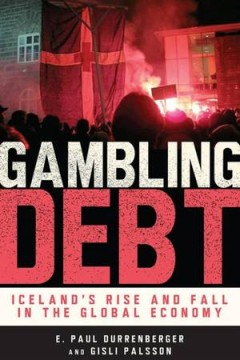
Mobilizing Global Knowledge Refugee Research in an Age of Displacement
In 2018, the United Nations High Commission for Refugees documented a record high 71.4 million displaced people around the world. As states struggle with the costs of providing protection to so many people and popular conceptions of refugees have become increasingly politicized and sensationalized, researchers have come together to form regional and global networks dedicated to working with dis…
- Edition
- -
- ISBN/ISSN
- 9781773850863
- Collation
- -
- Series Title
- -
- Call Number
- -
 Computer Science, Information & General Works
Computer Science, Information & General Works  Philosophy & Psychology
Philosophy & Psychology  Religion
Religion  Social Sciences
Social Sciences  Language
Language  Pure Science
Pure Science  Applied Sciences
Applied Sciences  Art & Recreation
Art & Recreation  Literature
Literature  History & Geography
History & Geography